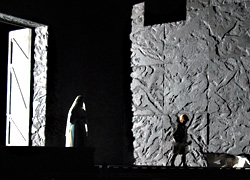Recitals of the year: Cellist Matt Haimovitz at the Tractor Tavern in January and violinist Gidon Kremer at Benaroya last month. They’re two string players not content with the usual solo career path, hopping from one orchestra to the next, playing the same five concertos. It’s not just that they have a taste for adventurous contemporary works; they’ve been rethinking the conventions of the recital format entirely. Haimovitz has been touring bars and coffeehouses, rather than halls and churches, performing cello-quartet arrangements of Bartok and Led Zeppelin with three of his students, while Kremer brought a percussionist and pianist, offering Bach for the solo marimba in addition to new pieces commissioned for the three of them together.
Departures: The Northwest Chamber Orchestra, victim of declining contributions and board burnout, abruptly shut down last spring (which also means so long to innovative pianist/conductor Ralf Gothoni); diva Carol Vaness left the UW voice department; brainy and charming conductor Huw Edwards moved on from the Seattle Youth Symphony; Byron Schenkman broke formal ties with the Seattle Baroque Orchestra he co-founded; and character singer extraordinaire Archie Drake suffered a fatal coronary just hours after his closing-night performance in Seattle Opera’s Macbeth, after 39 (!) seasons with the company.
Best opera moment (comedy): Jane Eaglen, as Rosalinde in Seattle Opera’s Die Fledermaus, is shocked to see her maid Adele (Sarah Coburn) at a party in one of her gowns. The zaftig Eaglen pointed at the petite Coburn and gasped, “My dress! She’s wearing half my dress!”
Best opera moment (tragedy): The climax of (DMA candidate) Andrew Seifert‘s thoughtfully, exquisitely uncomplicated production of Puccini’s Suor Angelica—a suicidal nun‘s magical vision of her lost child, escorted by the Virgin Mary. The music swelled and sparkled, a door creaked open, the stage was flooded with light, the golden-haired tyke tottered on, and I struggled to keep from audibly sobbing. And I’m not even Catholic.
Best opera debut: Up-and-coming tenor Joseph Calleja, an elegant, expressive stylist à la Juan Diego Florez (or—why not?—Jussi Björling), seduced the audience in the small but juicy part of Macduff in Seattle Opera’s Macbeth. When’s he coming back?
Best reason to feel confident about the future of opera: Seattle Opera’s Wagner Competition in August turned up a thrilling group of young (30ish) voices, especially winners James Rutherford and Miriam Murphy, both of whom I hope SO hires for a stage role at the earliest possible opportunity.
Worst reason: The “New Works Sampler” at May’s Opera America conference offered scenes from one charming and moving piece, Ramona Juengen’s Naomi’s Road (one Japanese family’s World War II internment ordeal, through the eyes of a young girl); a few drab ones (including Tobias Picker’s An American Tragedy, which had already been staged at the Met); and one pile of post-Menotti crap, Thomas Pasatieri’s Frau Margot, a piece so eye-rollingly hackneyed, so constipatedly pretentious, that it amazes me that anyone could think this is what opera audiences want.
Best ear candy:Asher Fisch‘s velvety-opulent way with the Seattle Symphony in the pit of Seattle Opera’s Der Rosen-kavalier, and the Esoterics’ ravishing performance of Berg, Mahler, and Strauss choral works this past month.
Best birthday party: For his 70th, insatiably curious sound explorer Stuart Dempster headlined a music circus that filled three levels of Town Hall with noisemakers from the imposing (Tibetan prayer horns) to the whimsical (rubber squeaky toys).
Best Mozart salute: UW’s eclectic dessert tray of a concert turned out to be the most engaging contribution to the Mozart 250th birthday overkill, opening with the breathtaking Adagio from his Gran Partita (the piece that drove Peter Shaffer’s Salieri to despair) and including a jazz version of his Symphony No. 40 and a sing-along rendition of one of Amadeus’ final gems, the Ave verum corpus.
Worst scandal: Or best, if you enjoy this sort of thing—the Seattle Symphony‘s recent conflict, degenerating into alleged intraplayer harassment and vandalism, surrounding the extension of Gerard Schwarz‘s music-director contract (through 2011). With one side’s seeming refusal to acknowledge that a smooth, well-considered transition to new leadership, sometime in the foreseeable future, really would be in the organization’s best interest, and the other’s absolutist dismissal of every decision Schwarz makes, on or off the podium, the continuing bad-blood impasse seems insurmountable. This we know: Digging in the heels is a stance hardly amenable either to making music or appreciating it.







